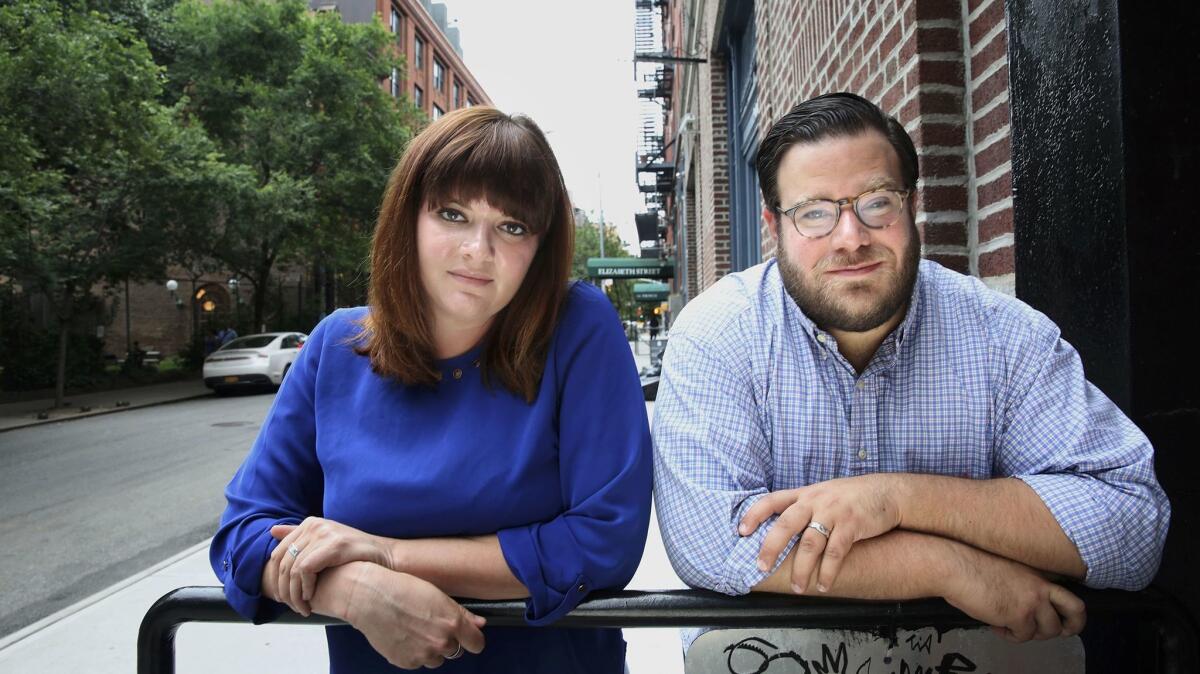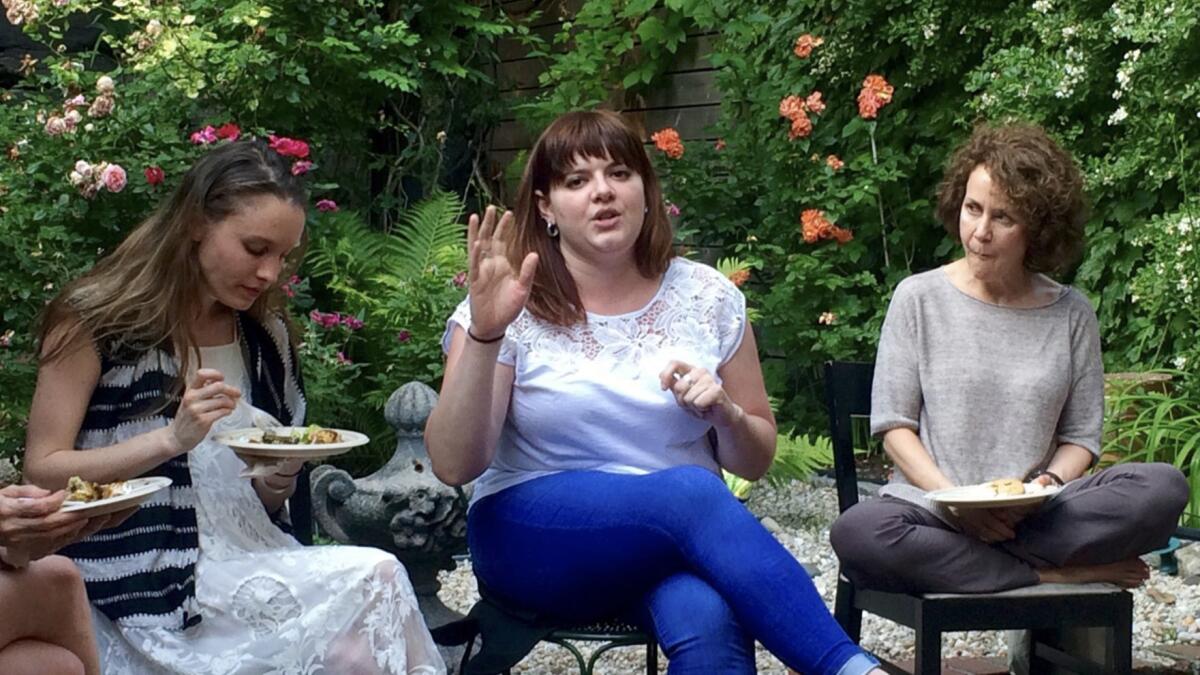Trump succeeds where Obama failed – spawning a new wave of liberal activism

- Share via
Reporting from New York — The night Hillary Clinton lost the White House, Amanda Litman cried so hard she threw up.
In Atlanta, as the returns rolled in, Traci Feit Love faced a question from her anguished 8-year-old daughter: “Now what do we do?”
Across the country, in the heart of Silicon Valley, Rita Bosworth wondered the same thing.
The three never met, never spoke, never communicated in any fashion. But in the days and weeks that followed, they became common threads in a sprawling patchwork: the angry and politically aggrieved who — with no help from politicians, political parties or any formal campaign structure — have joined to fight President Trump and his policies.
From her Brooklyn apartment, the 27-year-old Litman co-founded a group called Run For Something, which encourages people under age 35 to do just that. Thousands have signed up, many of them political novices.
Love, a 40-year-old attorney, took to Facebook and virtually overnight created Lawyers for Good Government, now a coast-to-coast army of legal experts battling Trump on issues such as immigration and a ban on travelers from six Muslim-majority countries.
Bosworth, 38, helped start a network that steers donors and activists in Democratic-leaning states like California toward legislative contests in more Republican redoubts, on the theory that their actions can have a greater impact where resources are scarce.
The “idea is to build a pipeline of candidates and create incubators for policy that can eventually take the national stage,” said Bosworth, who plans to leave her job as a San Jose public defender soon to work full time for her organization, the Sister District Project (as in “sister cities”).
It’s not a Bernie thing or a Hillary thing or an Obama thing. It’s about speaking with one voice.
— Alex Wall, Democratic communications strategist
Powered by social media and fired by deep antagonism, Bosworth and others have produced a movement seemingly without precedent: artists, doctors, lawyers, scientists, software engineers and others organizing themselves to seek elected office, flood congressional town hall meetings and agitate on a broad range of issues.
Their numbers are unknowable; for many, a good part of the appeal of the do-it-yourself movements is the lack of rigid structure or top-down management.
But seemingly every week brings a new group with new designs: academics giving advice, librarians raising their voices, quilters taking up their sewing needles.
It turns out Trump, a president loathed by Democrats, is a far greater spur to liberal activism than the revered Barack Obama, a former community organizer who hoped to inspire a wave of officeholders and Democratic idealists. Instead, he presided over the hollowing-out of his party.
“In November last year, being a politician was the last thing I would have ever, ever, ever intended to do,” said Kellen Squire, a 32-year-old emergency room nurse in central Virginia, who, helped by Litman’s group, is waging an uphill fight for a seat in the state House of Delegates. “But I saw whatever was going to come down the pike was going to be so jacked up, I wasn’t going to just take it. I had to stand up, yell, scream and holler.”
Not all of the incipient energy is being directed toward the electoral arena.
A group calling itself the Resistance Media Collective has assembled 200 animators, graphic designers, videographers and other volunteers to live-stream anti-Trump protests and produce materials such as a cartoon brochure titled “A Preparedness Guide for Undocumented Families.”
Its tips, in English and Spanish, include finding a U.S. citizen to act as a child’s legal guardian and advice on navigating the court system. “Our goal, very very simply, is to amplify the resistance,” said Kathryn Jones, 48, a former actress in New York City and one of the group’s leaders.
Much of the effort is aimed at revivifying a Democratic Party that lost hundreds of gubernatorial, congressional and legislative seats under Obama, slumping to its weakest position in decades.
But many involved have purposely kept their distance from the national party and also tried to steer clear of lingering resentments over who backed Clinton or Bernie Sanders in 2016.
“It’s not a Bernie thing or a Hillary thing or an Obama thing,” said Alex Wall, a Democratic communications strategist and one of dozens of volunteers working together to help the anti-Trump opposition hone its message and broaden its reach on Facebook, Twitter and other social media. “It’s about speaking with one voice.”
Party leaders say they welcome the freelancing. “We’re all united in the same message,” said Sabrina Singh, a spokeswoman for the Democratic National Committee. “We want to elect Democrats that reflect our values and the values of the states they’re running in.”

Litman, a product of the Washington, D.C., suburbs, started walking precincts in Virginia as a 16-year-old. She went from Obama’s political operation to directing Clinton’s 2016 email program. After her queasy election night, she binged on Netflix and traveled to Costa Rica, where she devoured a history of Emily’s List, the Democratic group that promotes women running for office.
She contemplated a life away from campaigns. During an interview with a New York publishing house, however, she found her thoughts drifting to the imagined horrors of a Trump presidency and passively watching from the sidelines.
“That just seemed pathetic,” she said, as she headed to her office for the day, a table and chair at a Lower Manhattan wine bar renting work space in the off hours.
Running up her credit cards and digging into savings, Litman worked with Democratic consultant Ross Morales Rocketto, the husband of a Clinton campaign co-worker, to launch Run For Something. Their idea was to tap thousands of political contacts and share that knowledge base with a fresh generation of candidates.
They launched on Inauguration Day, and within a week 500 people had visited their website and expressed interest. The number, Litman said, has since climbed to more than 10,000.
The most common question — what should I run for? — is easily answered, she told about 20 potential donors and candidates gathered beneath a leafy canopy at a backyard party in New York’s Brooklyn Heights. Decide the problem you want solved and the best place to do so, she said.
For many, that means local offices, such as school boards and city councils, which are easier to win than seats in Congress, and where results can be more immediate than in gridlocked Washington. “They’re affordable,” Litman said, as though peddling a line of practical footwear, “and so, so, so important.”
Candidates who pass a screening — they must be Democratic-leaning, personable and committed to the time and effort a campaign requires — are offered a buffet of free advice from political pros: how to file for office, write a news release, design a website.
Heather Ward, 21, a recent college graduate running for a school board seat outside Philadelphia, was counseled on door-to-door canvassing: Polish a crisp message; leave a note if no one’s home. With guidance from her tutor, who helped run Clinton’s North Carolina campaign, she finished atop a field of four candidates and reached the November runoff.
Like any start-up, there’s a freedom that comes with low overhead and minimal expectations. No fat cat donors to appease, no anxious incumbents to allay, so the group can look beyond a single election cycle.
The hope, of course, is to win wherever and whenever possible, Litman said, but more important is grooming a stable of newcomers who can step up years from now to run for governor or U.S. Senate.
Or, she posited, the ultimate post-Trump fantasy: “A 2032 presidential candidate who started with us.”
@markzbarabak on Twitter
ALSO
There’s only one Trump — that’s a key challenge for Democrats targeting GOP seats in 2018
Europe’s once-positive worldview of U.S. slips under Trump
What happens when scientists leave their labs to experiment with politics?
Billionaire Tom Steyer at a crossroad: Run for California governor or go after Trump?
More to Read
Get the L.A. Times Politics newsletter
Deeply reported insights into legislation, politics and policy from Sacramento, Washington and beyond. In your inbox twice per week.
You may occasionally receive promotional content from the Los Angeles Times.











